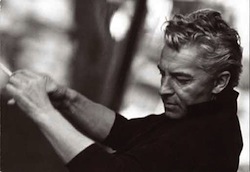Celia grabbed ‘Heros and Villians: Music Inspired By The Powerpuff Girls’ and the 1963 Herbert Von Karajan Beethoven symphony recordings tonight. I am quite tickled by the combination.
Over the next few hours, I will hear what I consider to be some of the greatest recordings of the greatest music of all time. But first – Devo, Shohen Knife, bis and Frank Black. Tamiko and I spent quite a bit of time watching the Powerpuff Girls early on in grad school. 10 minutes of sillyness with some pretty decent writing. ‘Meet the Beatalls’ is an episode I just referred someone to the other day (written almost completely in Beatles lyrics – pure genius). As for the music on the disc, it is rather hit or miss. But the bands above provide some pretty good tracks, especially Shohen Knife’s ode to Buttercup. I don’t think Celia or Mira are old enough for the Powerpuff Girls yet… but I am looking forward to the day when we can watch them together.
I think the Karajan discs are probably the recordings I sold more of then anything else during my record store days. Or it may be better to say, these are the discs I recommended to more people then anyone else (because I am pretty sure that even if I suggested and sold 50 of these sets, it would still pale in number to the thousands of copies of pop hits I would have actually taken cash for). These older analog recordings sound great, and the performances are stunningly beautiful. Quite possibly the height of Deutche Grammophone’s recording days matched by the height of Karajan’s conducting. I believe Karajan had recorded complete sets of the Beethoven symphonies two or three times before these DG recordings with his orchestra (Berlin). And he would go on to record the complete cylce two more times (once in the 70s and again in the 80s so they could be captured digitally), but it is the 1963 recordings that stand above and beyond the other recordings.
I tend to like my Beethoven played with smaller orchestras though. In fact I prpbably like other recordings here and there better then individual performances on these discs. But these performances really are the standard of standards for these pieces, and the quality and musicianship across the whole set really hasn’t been matched before or since. While tempos may be slower then what Beethoven may have wanted or the orchestra bigger, what these recordings seem to capture for me is a sense of what Karajan was doing as an interpreter in his time. This was HIS orchestra (he had been appointed director for life in 1955) and he had been shaping its sound for quite some time. And the Beethoven symphinies were the backbone of his repertoire. As recording technology improved he was always at the forefront, eager to explore new possibilites. I think in the 70s and 80s, this actually hurt his recorded documents however. These recordings were mostly recorded (I believe) in a church in Berlin, and the recording engineers were in a building across the street because of the lack of space. After a take was done, Karajan would run across the street to hear the recording and judge whether or not to do another take. But recording technology in these days wasn’t as advanced as they would be in the 70s… and while I am sure there is some editing in these discs, they feel more dynamic and musical to me then the performances from the 70s that seems unrealistically smooth and even (and the poor early digital technology couple with his old age make the recordings from the 80s particularly difficult to listen to). These are quite fiery at times, as well as amazingly dramatic.
The recording of the 7th on these discs is especially beautiful. It is the stand out of this set. The first movement has excitement (the transition from the opening Adagio to the Allegro almost sounds avant-garde in it’s clarity). The second movement is by far the most deeply moving version of this piece I have ever heard, and it provides stunning contrast to the third and fourth movements. Karajan is often given credit (in his live performances) for shaping a beautiful dramatic arch through an entire piece, and while his reocrdings sometimes lose this it is far from the case in this recording of the 7th.
Time to put it on actually…



